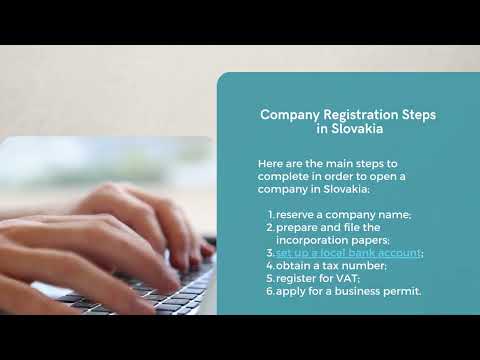
Understanding Business Registration in Slovakia
Overview of Business Registration Process
Starting a business in Slovakia is an exciting journey! From my experience, the business registration process is relatively straightforward but requires careful steps. You first need to decide your business entity type, gather necessary documents, and submit an application to the Trade Register.
Here’s a quick breakdown of the key stages:
- Choose a business name
- Select a business type
- Prepare documents
- Register with the Trade Register
Importance of Registering Your Business
Registering your business is crucial for several reasons:
- Legal Protection : It offers your business a legal identity and protects your brand.
- Financial Opportunities : It opens doors for banking and financing options.
- Credibility : Registered businesses are often viewed as more trustworthy by customers.
In my journey, seeing my business officially registered was a huge milestone, reinforcing my commitment and attracting clients.
Legal Requirements for Business Registration
Types of Business Entities in Slovakia
When I started my business, one of the first decisions I faced was choosing the right type of business entity. In Slovakia, you have several options, each with its pros and cons:
- Sole Proprietorship : Ideal for individuals wanting full control but with personal liability.
- Limited Liability Company (LLC) : Offers liability protection and is perfect for small to medium enterprises.
- Joint-Stock Company : Suited for larger businesses needing significant capital.
Each entity offers a different level of protection and flexibility.
Documents Needed for Registration
Once you’ve decided on the business entity, gathering the necessary documents is vital. Here’s what you typically need:
- Application form : This is essential for registration.
- Proof of identity : Such as a passport or ID card.
- Registered office address : A legal address for your business.
- Business plan : Not always required, but highly recommended.
I remember frantically gathering these documents, and having everything organized made the process much smoother!

Steps to Registering Your Business
Step 1: Choose Your Business Name
First things first, selecting a catchy and memorable business name is crucial! I spent hours brainstorming and asking friends for input. Ensure your name reflects your brand and isn’t already in use.
Step 2: Choose Your Business Type
Next up, decide on the type of business entity that fits your vision. Whether it’s a sole proprietorship for simplicity or an LLC for liability protection, each has unique perks.
Step 3: Prepare Necessary Documents
Gathering the necessary documents is the spine of the registration process. Remember to include:
- Application form
- Identification proof
- Company address details
Being organized here can make everything smoother!
Step 4: Register Your Business with the Trade Register
Finally, it’s time to register your business with the Trade Register! I felt a rush of excitement as I submitted my application. This step officially puts your business on the map and allows you to start operating legally!

Tax Obligations and Regulations
Overview of Taxation for Businesses in Slovakia
Once my business was up and running, I quickly realized that understanding Slovakia’s taxation system was essential. Businesses here are primarily subject to corporate income tax and value-added tax (VAT), affecting how you budget and plan.
Here’s a quick rundown of key taxes:
- Corporate Income Tax : A flat rate of 21% on profits.
- Local Taxes : Depending on your municipality, additional local taxes may apply.
Understanding VAT and Income Tax
VAT in Slovakia operates at a standard rate of 20%, with a reduced rate of 10% for certain goods and services. I remember the shock of calculating my VAT on sales!
Income tax can vary for individuals, but businesses must be vigilant about their tax obligations. Regular tracking and consulting with a tax advisor was crucial for me, making sure I stayed compliant while maximizing my deductions.
Post-Registration Responsibilities
Obtaining Business Licenses and Permits
After registering my business, I quickly learned that obtaining the right licenses and permits was crucial to stay compliant. Depending on your industry, you may need a variety of licenses. For example:
- Health permits for food-related businesses
- Building permits for any physical location alterations
- Local operating licenses specific to your municipality
Navigating this process was initially overwhelming, but once I knew which licenses applied to my business, it became manageable.
Understanding Employment Laws
As my team started to grow, understanding employment laws became a priority. Slovakia has specific regulations regarding employee rights, contracts, and working conditions. I recall feeling relieved when I learned about mandatory aspects such as:
- Employment contracts : Clearly outlining roles and responsibilities
- Social security contributions : Both employer and employee obligations
Staying informed about these laws not only ensured compliance but created a harmonious workplace environment as well!
Conclusion
Summary of Business Registration Process in Slovakia
Reflecting on my experience, the business registration process in Slovakia is an exhilarating journey filled with essential steps—from choosing your business name to navigating the legalities of taxes and permits. It sets the foundation for a successful venture.
Tips for Successful Business Registration
Here are a few tips that helped me along the way:
- Plan Ahead : Research your business entity and tax obligations in advance.
- Stay Organized : Keep all documents in one place to avoid last-minute scrambles.
- Consult Professionals : Don’t hesitate to seek advice from legal and financial experts.
Remember, a well-planned approach can turn that initial excitement into long-term success!


No responses yet